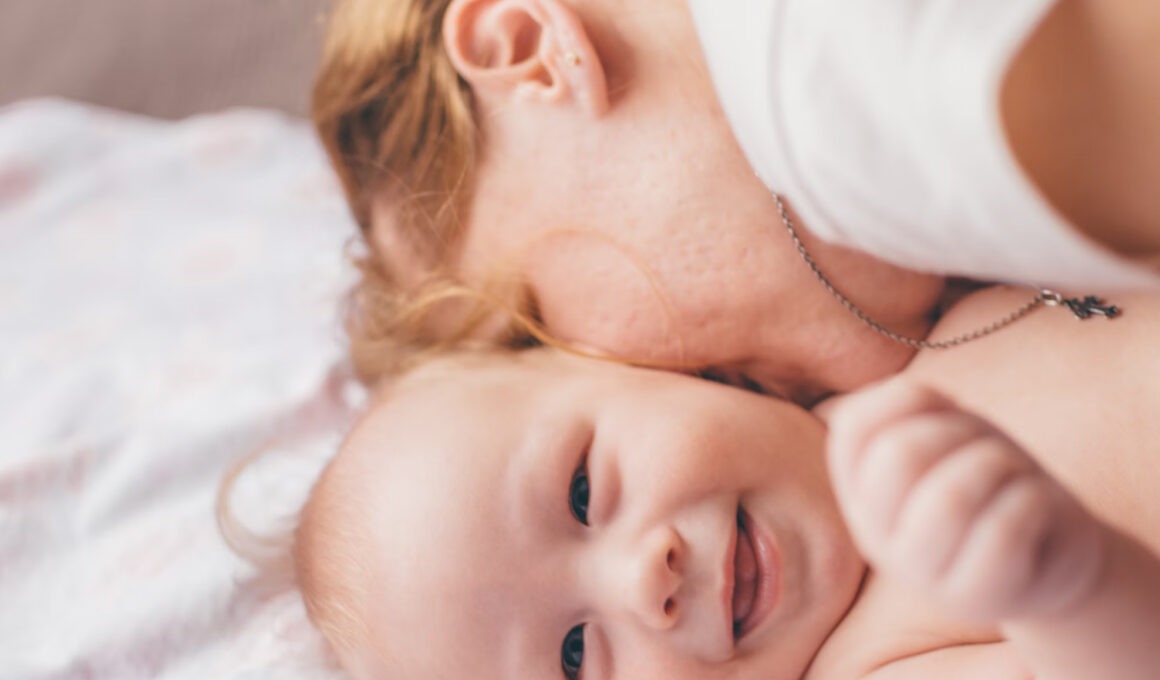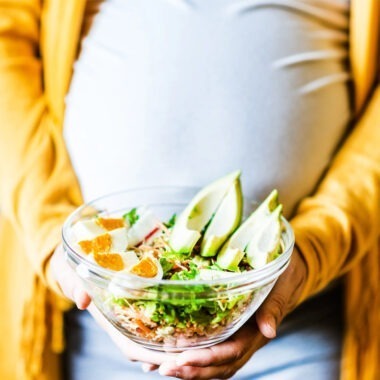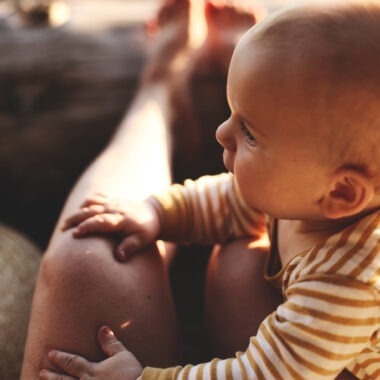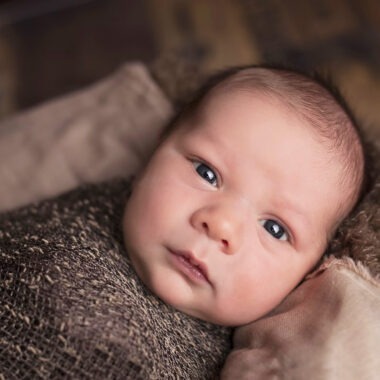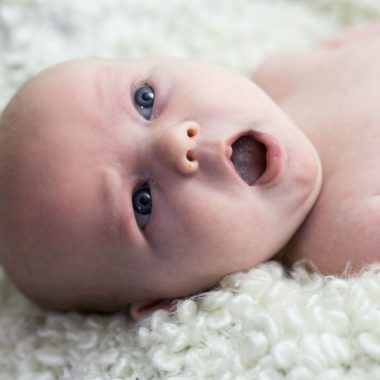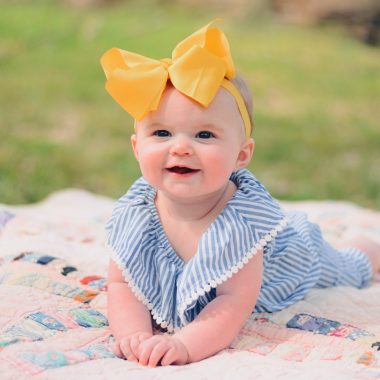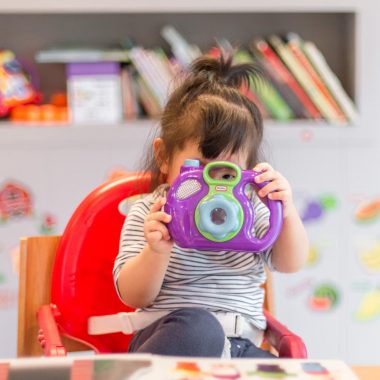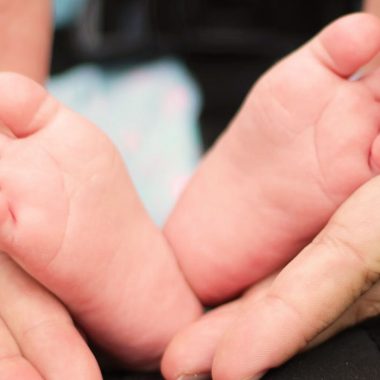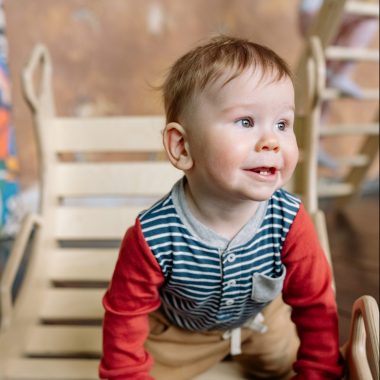Your baby’s first smile sure makes all those sleepless nights, tired mornings, and stressful days following birth worth it. When your little one’s face lights up with their first smile, it marks one of the first precious milestones a parent can experience.
Smiling and laughter is an important indicator of your baby’s developing social skills. It marks one of the many ways your child communicates effectively with their environment.
As a general rule, babies react to different sounds and stimuli in their environment from the very beginning. Crying, screaming, moaning and responding to approaching footsteps or loud noises are all examples of how your baby interacts with their environment.
Similarly, smiling or laughing is one of the many ways your baby reacts to and interacts with their surroundings. That is why your baby’s first smile or laugh marks an important milestone in their development.
If you are waiting eagerly to catch your baby’s first smile or laugh, trust us, as parents we get it. It is an exhilarating moment and you wouldn’t want to miss it for the world. This is why Invidyo, the world’s smartest AI baby monitor, captures your baby’s smiles with beautiful hi-res photos.
Even if you’re not in the vicinity of your baby when they crack their first little grin, Invidyo will capture it for you.
In this article, we will dive into the developmental stages of when do babies start laughing and also share the importance of laughter in your baby’s growth.
When Does a Newborn Baby Start Laughing?
Babies start laughing very early. In fact, evidence shows that your baby’s facial expressions begin developing in the womb. Babies start smiling and laughing as early as 24 weeks in the womb. This become smore evident around the 32nd week.
The difference lies in the fact that this laughter is reflexive and not social – meaning that it is not influenced by social surroundings or external stimuli. For that reason, this laughter is not considered “real”. In this article we are focusing on smiling and laughter that is a result of social interactions.
Newborn babies may smile when burping, falling asleep, relaxing, or urinating. Babies make many attempts before they can smile in a “real” social way.
- Your baby’s first “real” smiles can usually be seen between the 6th and 8th week following birth.
- The next social milestone for babies who start smiling at around the 8th week is to laugh out loud.
- Around the 4th month, your baby begins to “giggle” in response to anything you do. These first smiles are very unpredictable. The reason for why your baby may laugh once may not apply a second time.
- In the 6th month, your baby can respond with smiling or laughing when introduced to a funny sound or a gentle tickle.
As a parent, remember that you are the biggest reason for your baby to smile or laugh. You and (your partner) are your baby’s favorite people. And there is nothing more wonderful than for your baby to communicate with you.
When Does a Baby’s First Social Smile Occur?
Your baby’s first social smile, or in general terms, their first “real” smile, usually occurs between weeks 6 and 8. This smile comes mostly for you i.e. the parents.
- Your baby will appear happy and excited when they see their mother or father.
- When a baby laughs, they use their whole face and not just the mouth. You can easily notice the difference between reflexive laughter and social laughter. Soon social laughter will become a way for the baby to communicate with you and their environment.
- When your baby reaches the 3rd month, they will try to grab your attention by babbling and laughing, and maybe even starting a conversation with you. It’s important to join in on this conversation and make it a point to enjoy the moment by laughing and talking with your baby as you would in a regular conversation.
How Can I Make My Baby Laugh?
There are many different ways to make your baby laugh and help them familiarize themselves with laughter as a response. These include:
- Smiling at them
- Embracing them
- Playing games with them
- Singing to them
- Talking to them often
And don’t ever think that you can overdo any of that and end up “spoiling” your baby. Your baby thrives on communicating with you. They feel seen and acknowledged when you engage with them effectively and frequently.
Research shows that babies whose needs are met by their parents on time and who receive their parents’ love and affection unconditionally
- develop faster
- have bigger brains, and
- are more social.
In short, if you can’t wait for your baby’s first “real” smile, give them your attention, communication and love without holding back.
My baby is not smiling. Should I be worried?
Just like every other developmental milestone, some babies begin smiling and laughing sooner than others. If your 1-month old baby hasn’t started laughing yet, there is no reason to panic. They might just be a little slower to pick that up.
Even if your baby is the happiest baby in the world,
their first “real” smile may be so subtle, you might not even notice it.
Your baby may show their first “real” smile any time between 4 weeks and 4 months. However, the reason why parents begin getting concerned when their baby shows delays in smiling or laughing is because of the possibility that their child might be autistic.
Autism is a legitimate concern for parents. One of the early signs of autism is delayed laughter. However, this is a very rare symptom and does not mean much on its own.
Let’s suppose your baby is 4 months old and you still haven’t seen their “real” smile yet. But, your baby,
- Makes eye contact
- Makes various sounds and
- Responds to verbal and visual cues from you.
This eradicates the possibility of your baby having autism, and you can rest easy knowing that they simply aren’t ready to express joy through laughter. It is important to give your baby time with their developmental stages as each baby grows at a different pace.
In any case, to put your mind at ease, you can always consult your pediatrician for proper advice and counseling.
Can My 4-Week-Old Baby Laugh?
4 week old babies do laugh but their laughter is mostly a reflexive, involuntary movement. At this stage, your baby does not yet have the capacity to develop a real smile.
Many babies show their first real smile at around 3 or 4 months of age. For some babies, this can take longer. Your baby’s smile can be triggered by a favorite toy, animal, or person that they are excited to see. This mostly occurs with parents as the child is already familiar with them and experiences the most amount of contact and interaction with them.
Interestingly enough, your baby loves your reaction to their laughter. Once they discover how to laugh and witness the effects of their laughter on the surrounding company, they will laugh even more.
With every smile, your baby exercises their mouth and tongue as well as their capacity to produce different sounds.
Can My 2-Month-Old Baby Laugh?
Yes, a 2-month-old baby can laugh. However, in general, a “real” laugh is expected from a baby between the 3rd and 4th month.
Reflex laughter in babies gradually disappears around the 2nd month. And the first smile may appear in the 2nd or 3rd month.
You can distinguish between reflexive laughter and real laughter depending on the duration and timing of the laugh.
- Reflexive laughter is usually short-lived. It may appear randomly when the baby is sleeping or tired.
- Real laughter occurs in response to stimuli. For example, a baby seeing their parents or hearing an older sibling’s voice.
- You can also gauge the “realness” of your baby’s laughter by the expression on your baby’s face.
Why Does My Baby Laugh While Sleeping?
It is common for babies to laugh or smile in their sleep. No one knows what babies dream about yet. For that reason, the only explanation is that your baby is responding to their dreams.
When the baby enters their active sleep cycle (REM phase), they move involuntarily. These movement include laughing, humming, grimacing, and stretching.
How Does Laughter Affect Baby Development?
Laughter in babies is an important developmental milestone. It affects other aspects of their development and has an overall positive effect on their mood and growth.
- When your baby smiles, it means that their vision is improving and they can recognize your face.
- Your baby’s brain and nervous system eliminate reflex laughter. When your baby starts “real” laughter, they become aware that laughter connects them with others.
- Your baby begins to realize the importance of emotions and their direct impact on those around. They also learn to laughs to express pleasure, joy, contentment, and happiness.
What To Pay Attention to When Making a Baby Laugh?
Every baby’s mood and preferences are different. Just like adults. And the things that make one baby laugh may not make another baby laugh. It may even bother you.
Therefore, we need to take some things into consideration when trying to make a baby laugh.
- Start with trying various methods to make your baby laugh after the baby begins communicating more clearly and expressing their feelings.
- While tickling may appeal to some babies, it can be uncomfortable for others. Some experts do not recommend tickling babies. Others say that you should be very gentle when tickling your baby and follow your baby’s reactions with great care.
- Be careful with unwanted physical contact. As soon as a baby shows discomfort or displeasure, stop touching them.
- Pay attention to timing. A hungry or tired baby may not be interested in laughing. Wait until the baby is full, has a clean diaper and is well rested.
My baby is not smiling at 4 months
According to developmental milestones, on average, a baby is expected to laugh by the age of 3 or 4 months. However, if your baby has crossed the 4th month mark and still shows no signs of merriment, it is not cause for concern.
According to Healthline experts, some babies are more serious than others and may not appear as cheerful. It may be normal for a 4-month-old baby not to laugh, but other developmental milestones should also be evaluated.
If your baby has not yet reached more than one milestone specific to their current age, then you should consult a doctor and closely monitor their development.
Here are some of important developmental milestones for the 4th month:
- random laughter
- following moving objects or people with the eyes
- looking at faces and remembering familiar people
- displaying a preference for certain people
- making sounds such as babbling or purring
If you are concerned about your baby not smiling or not meeting other developmental milestones, be sure to talk to your doctor.
When Should I See a Doctor If My Baby Is Not Smiling?
Milestones are important in every baby’s development. Although experts give average ranges to achieve these milestones, one thing is very important: Every baby’s development is different. And what is most important is that your baby undergoes regular checkups, especially during the first 3 years of life.
Laughter is one of the many important milestones for every baby.
Let’s say your baby is 6 months old, but you haven’t witnessed their first laugh yet. Experts recommend that you seek professional advice from a doctor.
Some common indicators to take into consideration from a developmental perspective in the first year of your baby’s life are:
- Lack of humming and babbling
- Not making eye contact
- Diminished hand, arm and head movements
- Irritability or shaky, uncontrolled movements
- Lack of social smiling or laughing
- Losing previously acquired skills
- Poor muscle control
Witnessing your baby’s first smile or laugh is one of the most heartwarming experiences a parent can have. Not only does it mark a significant developmental milestone but also deepens the bond between you and your little one. As we’ve explored, laughter and smiling are crucial indicators of your baby’s growing social skills and emotional development.
Each baby’s journey is unique, and they all reach these milestones at their own pace. Whether your baby is already giggling away or still working on that first smile, cherish every moment. Remember, your loving interactions and shared joy play a pivotal role in nurturing their growth and happiness.
With tools like Invidyo, you can ensure you never miss these precious moments, capturing every adorable grin and laugh in high resolution. So, keep engaging with your baby, showering them with attention, and watching as they unfold their delightful personalities through every smile and giggle.
If you have concerns about your baby’s development or if they’re not meeting expected milestones, don’t hesitate to reach out to your pediatrician for guidance and support. After all, every smile, laugh, and coo is a step toward your baby’s bright, joyful future.
—
Sources: whattoexpect.com, healthline.com, verywellfamily.com, parents.com, ideas.ted.com, wsj.com, babycenter.com, bbc.co.uk, gold.ac.uk, healthychildren.org


